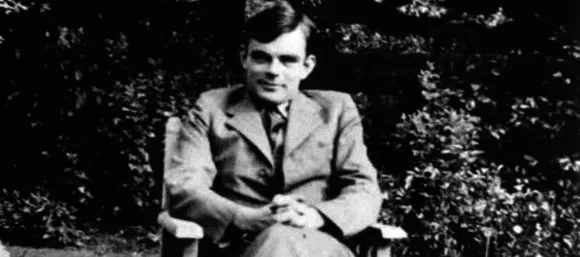We have some bittersweet news for you this Christmas Eve day: Alan Turing—computer genius, codebreaker, World War II hero—has finally had his 1952 conviction for homosexuality overturned by the British government. “Sweet” because it’s been a long time coming. “Bitter” because it in no way erases his initial conviction and its heartbreaking results.
As a codebreaker for Bletchley Park during World War II, Turing was an essential member of a team that deciphered German Naval codes. For his contributions to the British war efforts in 1952 he was convicted for homosexuality and given a choice between imprisonment and chemical castration. He chose the latter. In addition, his security clearance was revoked, because you just can’t trust those daaaaangerous homosexuals with access to sensitive materials. It’s not like Turing and his team in all likelihood accomplished the small task of shortening World War II or anything. In 1954 Turing was found dead, a result of eating an apple laced with cyanide. Though there is some dispute, the general consensus is that it was suicide.
60 years later, a campaign to reverse Turing’s conviction has finally found success. Says Justice Minister Chris Grayling, who officially requested the pardon:
“Dr Alan Turing was an exceptional man with a brilliant mind… His later life was overshadowed by his conviction for homosexual activity, a sentence we would now consider unjust and discriminatory and which has now been repealed. Turing deserves to be remembered and recognised for his fantastic contribution to the war effort and his legacy to science. A pardon from the Queen is a fitting tribute to an exceptional man.”
‘Bout darn time. Some have expressed displeasure at the pardon, not because it’s wrong, but because they see it as an empty gesture. Or, to put it in the words of computing pioneer Sir Clive Sinclair: “I just think it’s ridiculous, frankly. He’s been dead these many years so what’s the point? It’s a silly nonsense. He was such a fine, great man, and what was done was appalling of course. It makes no sense to me, because what’s done is done.”
I can see where he’s coming from, but I’m going to have to respectfully disagree. Does the pardon change was what done to Turing? No. But it’s a noble gesture, and dammit, those have value, even if it’s just in raising awareness of Turing and the thousands of other men—at least 50,000, according to human rights campaigner Peter Tatchell—convicted before male homosexuality was decriminalized in England and Wales in 1967. Turing’s pardon “is one small step on the way to making some real positive change happen to all the people that were convicted,” says Dr. Sue Black, one of the key figures in the Turing campaign. “It’s a disgrace that so many people were treated so disrespectfully.”
“The problem [for the government], of course” continues Glyn Hughes, sculptor of Manchester’s Alan Turing Memorial:
“if there was a general pardon for men who had been prosecuted for homosexuality, many of them are still alive and they could get compensation.”
That, incidentally, ties in with the reason an earlier request to pardon Turing was denied. Lord McNally, the justice secretary at the time, opined that Turing “was properly convicted of what at the time was a criminal offence.” All these guys did do something that was technically illegal, so what’s the point in officially, legally admitting that the law was bogus in the first place, right? It’s not like any of them are still alive (except there are). It’s not like there are a ton of people out there, in the UK and elsewhere, who still think one’s sexual preference is grounds for having one’s rights taken away (except there totally, absolutely are).
But for today I will allow myself a glimmer of Christmas good cheer. Because Alan Turing got pardoned. It’s not much, but it’s something.
(BBC News, via Death and Taxes)
Are you following The Mary Sue on Twitter, Facebook, Tumblr, Pinterest, & Google +?









Published: Dec 24, 2013 01:00 pm